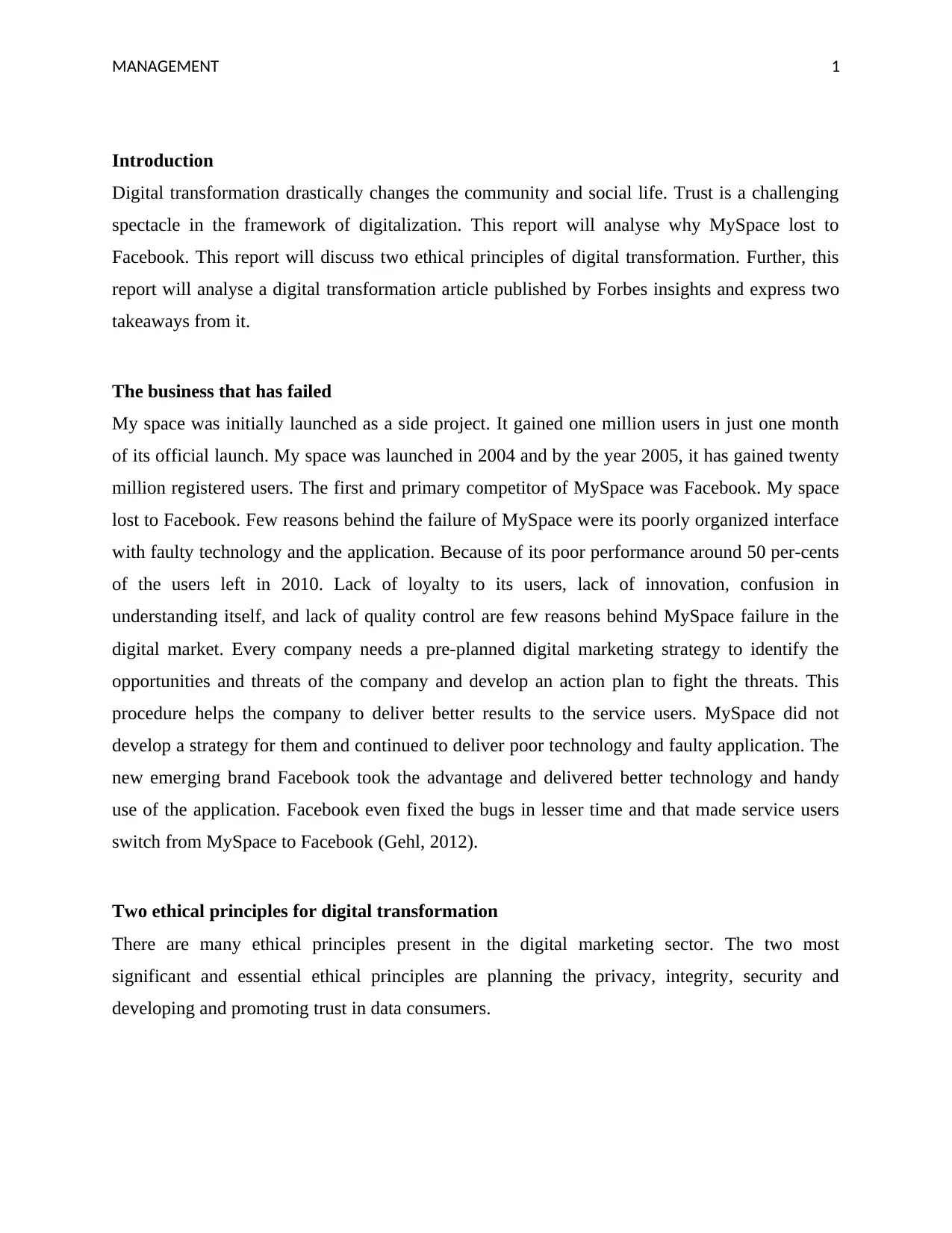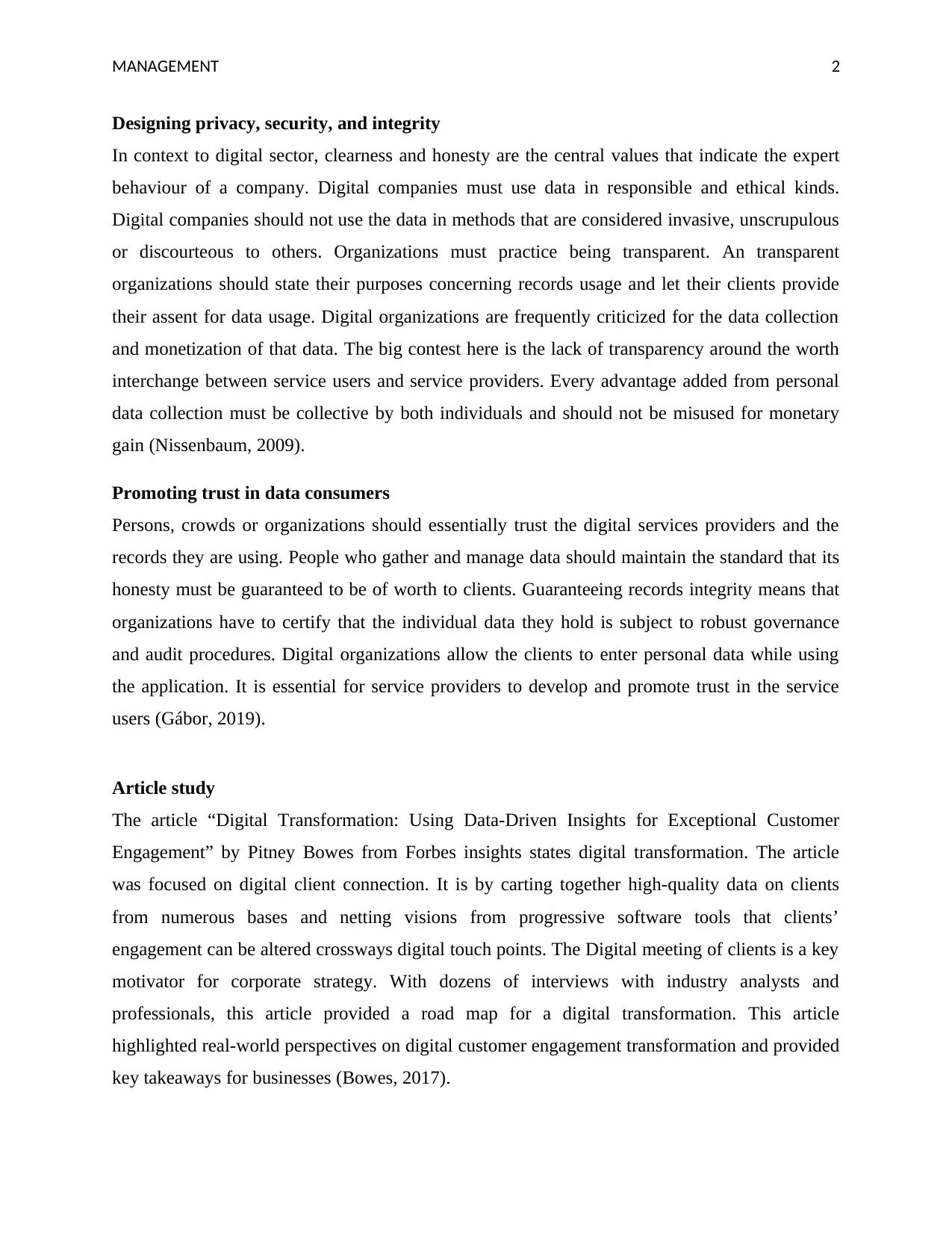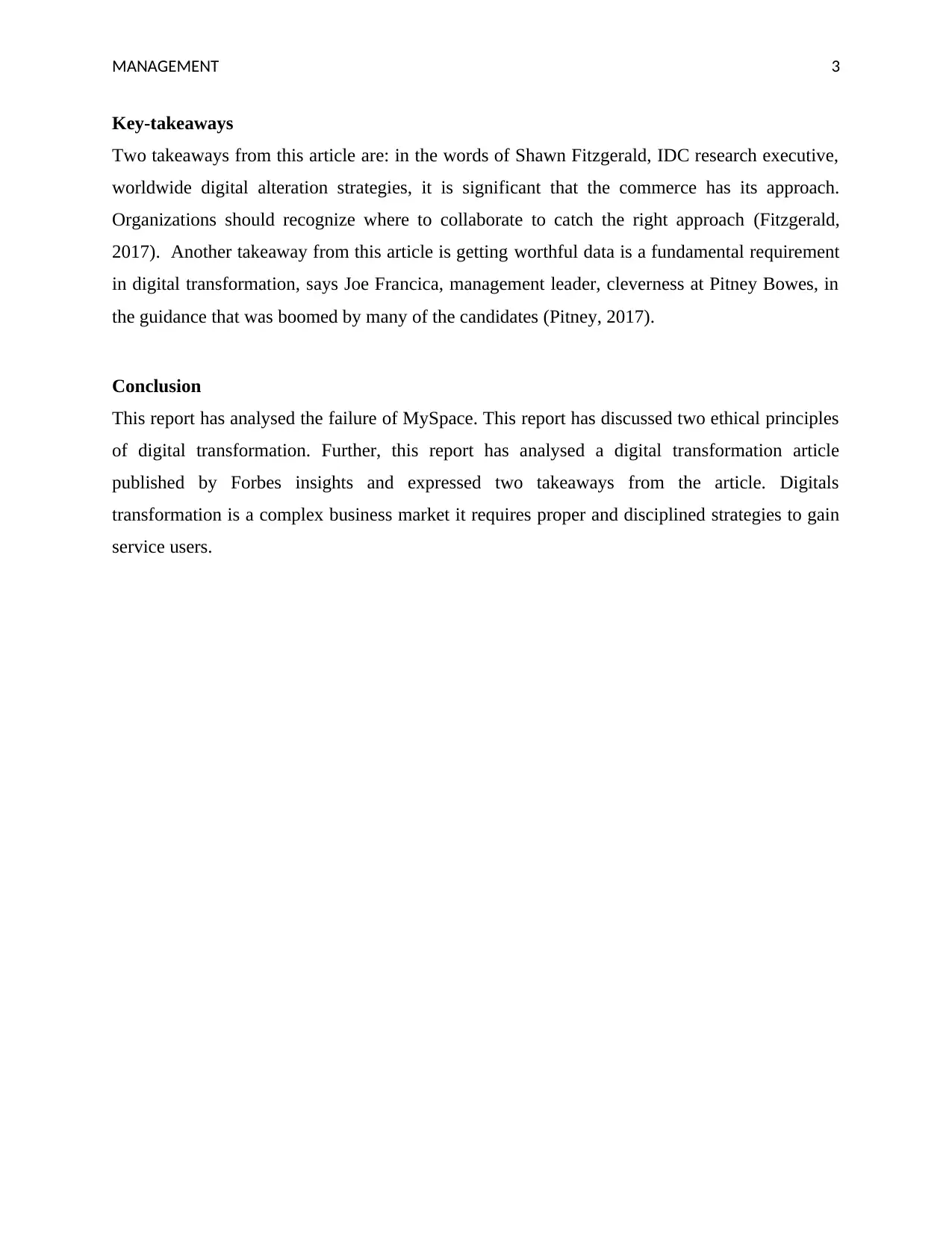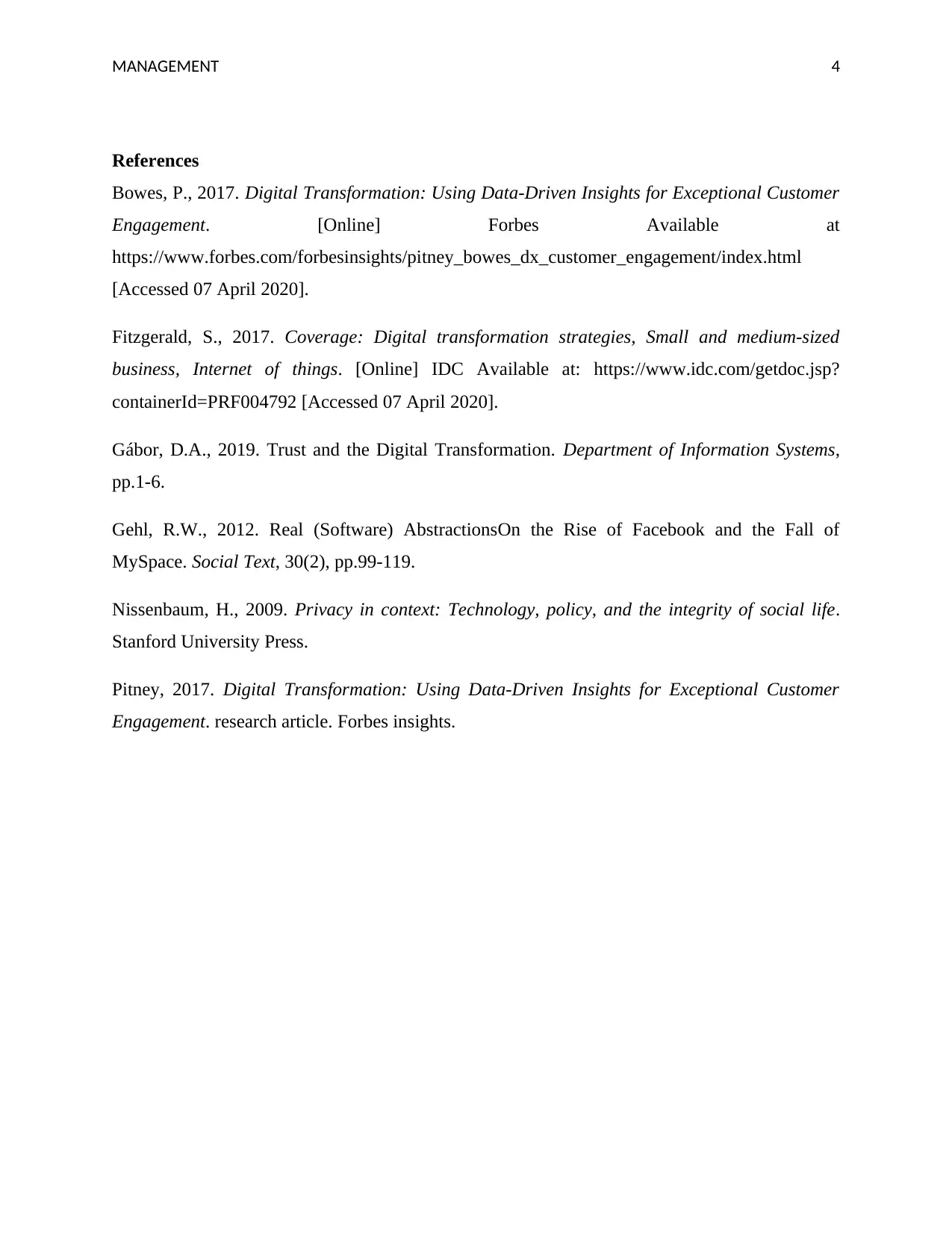Digital Business Strategy, Ethics, and MySpace's Failure Analysis
VerifiedAdded on 2022/09/13
|5
|1057
|16
Discussion Board Post
AI Summary
This discussion board post analyzes the failure of MySpace, attributing its downfall to a lack of a well-defined digital business strategy and technological shortcomings compared to competitors like Facebook. The post further explores two crucial ethical principles for digital transformation: designing for privacy, security, and integrity, and promoting trust in data consumers. It emphasizes the importance of transparency, responsible data usage, and robust governance. Additionally, the post summarizes an article from Forbes Insights on digital transformation, highlighting key takeaways such as the need for a clear approach and the significance of valuable data in driving customer engagement. The analysis underscores the complex and strategic nature of digital transformation in the modern business landscape.

RUNNING HEAD: MANAGEMENT 0
Digital business April 7
2020
Digital business April 7
2020
Paraphrase This Document
Need a fresh take? Get an instant paraphrase of this document with our AI Paraphraser

MANAGEMENT 1
Introduction
Digital transformation drastically changes the community and social life. Trust is a challenging
spectacle in the framework of digitalization. This report will analyse why MySpace lost to
Facebook. This report will discuss two ethical principles of digital transformation. Further, this
report will analyse a digital transformation article published by Forbes insights and express two
takeaways from it.
The business that has failed
My space was initially launched as a side project. It gained one million users in just one month
of its official launch. My space was launched in 2004 and by the year 2005, it has gained twenty
million registered users. The first and primary competitor of MySpace was Facebook. My space
lost to Facebook. Few reasons behind the failure of MySpace were its poorly organized interface
with faulty technology and the application. Because of its poor performance around 50 per-cents
of the users left in 2010. Lack of loyalty to its users, lack of innovation, confusion in
understanding itself, and lack of quality control are few reasons behind MySpace failure in the
digital market. Every company needs a pre-planned digital marketing strategy to identify the
opportunities and threats of the company and develop an action plan to fight the threats. This
procedure helps the company to deliver better results to the service users. MySpace did not
develop a strategy for them and continued to deliver poor technology and faulty application. The
new emerging brand Facebook took the advantage and delivered better technology and handy
use of the application. Facebook even fixed the bugs in lesser time and that made service users
switch from MySpace to Facebook (Gehl, 2012).
Two ethical principles for digital transformation
There are many ethical principles present in the digital marketing sector. The two most
significant and essential ethical principles are planning the privacy, integrity, security and
developing and promoting trust in data consumers.
Introduction
Digital transformation drastically changes the community and social life. Trust is a challenging
spectacle in the framework of digitalization. This report will analyse why MySpace lost to
Facebook. This report will discuss two ethical principles of digital transformation. Further, this
report will analyse a digital transformation article published by Forbes insights and express two
takeaways from it.
The business that has failed
My space was initially launched as a side project. It gained one million users in just one month
of its official launch. My space was launched in 2004 and by the year 2005, it has gained twenty
million registered users. The first and primary competitor of MySpace was Facebook. My space
lost to Facebook. Few reasons behind the failure of MySpace were its poorly organized interface
with faulty technology and the application. Because of its poor performance around 50 per-cents
of the users left in 2010. Lack of loyalty to its users, lack of innovation, confusion in
understanding itself, and lack of quality control are few reasons behind MySpace failure in the
digital market. Every company needs a pre-planned digital marketing strategy to identify the
opportunities and threats of the company and develop an action plan to fight the threats. This
procedure helps the company to deliver better results to the service users. MySpace did not
develop a strategy for them and continued to deliver poor technology and faulty application. The
new emerging brand Facebook took the advantage and delivered better technology and handy
use of the application. Facebook even fixed the bugs in lesser time and that made service users
switch from MySpace to Facebook (Gehl, 2012).
Two ethical principles for digital transformation
There are many ethical principles present in the digital marketing sector. The two most
significant and essential ethical principles are planning the privacy, integrity, security and
developing and promoting trust in data consumers.

MANAGEMENT 2
Designing privacy, security, and integrity
In context to digital sector, clearness and honesty are the central values that indicate the expert
behaviour of a company. Digital companies must use data in responsible and ethical kinds.
Digital companies should not use the data in methods that are considered invasive, unscrupulous
or discourteous to others. Organizations must practice being transparent. An transparent
organizations should state their purposes concerning records usage and let their clients provide
their assent for data usage. Digital organizations are frequently criticized for the data collection
and monetization of that data. The big contest here is the lack of transparency around the worth
interchange between service users and service providers. Every advantage added from personal
data collection must be collective by both individuals and should not be misused for monetary
gain (Nissenbaum, 2009).
Promoting trust in data consumers
Persons, crowds or organizations should essentially trust the digital services providers and the
records they are using. People who gather and manage data should maintain the standard that its
honesty must be guaranteed to be of worth to clients. Guaranteeing records integrity means that
organizations have to certify that the individual data they hold is subject to robust governance
and audit procedures. Digital organizations allow the clients to enter personal data while using
the application. It is essential for service providers to develop and promote trust in the service
users (Gábor, 2019).
Article study
The article “Digital Transformation: Using Data-Driven Insights for Exceptional Customer
Engagement” by Pitney Bowes from Forbes insights states digital transformation. The article
was focused on digital client connection. It is by carting together high-quality data on clients
from numerous bases and netting visions from progressive software tools that clients’
engagement can be altered crossways digital touch points. The Digital meeting of clients is a key
motivator for corporate strategy. With dozens of interviews with industry analysts and
professionals, this article provided a road map for a digital transformation. This article
highlighted real-world perspectives on digital customer engagement transformation and provided
key takeaways for businesses (Bowes, 2017).
Designing privacy, security, and integrity
In context to digital sector, clearness and honesty are the central values that indicate the expert
behaviour of a company. Digital companies must use data in responsible and ethical kinds.
Digital companies should not use the data in methods that are considered invasive, unscrupulous
or discourteous to others. Organizations must practice being transparent. An transparent
organizations should state their purposes concerning records usage and let their clients provide
their assent for data usage. Digital organizations are frequently criticized for the data collection
and monetization of that data. The big contest here is the lack of transparency around the worth
interchange between service users and service providers. Every advantage added from personal
data collection must be collective by both individuals and should not be misused for monetary
gain (Nissenbaum, 2009).
Promoting trust in data consumers
Persons, crowds or organizations should essentially trust the digital services providers and the
records they are using. People who gather and manage data should maintain the standard that its
honesty must be guaranteed to be of worth to clients. Guaranteeing records integrity means that
organizations have to certify that the individual data they hold is subject to robust governance
and audit procedures. Digital organizations allow the clients to enter personal data while using
the application. It is essential for service providers to develop and promote trust in the service
users (Gábor, 2019).
Article study
The article “Digital Transformation: Using Data-Driven Insights for Exceptional Customer
Engagement” by Pitney Bowes from Forbes insights states digital transformation. The article
was focused on digital client connection. It is by carting together high-quality data on clients
from numerous bases and netting visions from progressive software tools that clients’
engagement can be altered crossways digital touch points. The Digital meeting of clients is a key
motivator for corporate strategy. With dozens of interviews with industry analysts and
professionals, this article provided a road map for a digital transformation. This article
highlighted real-world perspectives on digital customer engagement transformation and provided
key takeaways for businesses (Bowes, 2017).
⊘ This is a preview!⊘
Do you want full access?
Subscribe today to unlock all pages.

Trusted by 1+ million students worldwide

MANAGEMENT 3
Key-takeaways
Two takeaways from this article are: in the words of Shawn Fitzgerald, IDC research executive,
worldwide digital alteration strategies, it is significant that the commerce has its approach.
Organizations should recognize where to collaborate to catch the right approach (Fitzgerald,
2017). Another takeaway from this article is getting worthful data is a fundamental requirement
in digital transformation, says Joe Francica, management leader, cleverness at Pitney Bowes, in
the guidance that was boomed by many of the candidates (Pitney, 2017).
Conclusion
This report has analysed the failure of MySpace. This report has discussed two ethical principles
of digital transformation. Further, this report has analysed a digital transformation article
published by Forbes insights and expressed two takeaways from the article. Digitals
transformation is a complex business market it requires proper and disciplined strategies to gain
service users.
Key-takeaways
Two takeaways from this article are: in the words of Shawn Fitzgerald, IDC research executive,
worldwide digital alteration strategies, it is significant that the commerce has its approach.
Organizations should recognize where to collaborate to catch the right approach (Fitzgerald,
2017). Another takeaway from this article is getting worthful data is a fundamental requirement
in digital transformation, says Joe Francica, management leader, cleverness at Pitney Bowes, in
the guidance that was boomed by many of the candidates (Pitney, 2017).
Conclusion
This report has analysed the failure of MySpace. This report has discussed two ethical principles
of digital transformation. Further, this report has analysed a digital transformation article
published by Forbes insights and expressed two takeaways from the article. Digitals
transformation is a complex business market it requires proper and disciplined strategies to gain
service users.
Paraphrase This Document
Need a fresh take? Get an instant paraphrase of this document with our AI Paraphraser

MANAGEMENT 4
References
Bowes, P., 2017. Digital Transformation: Using Data-Driven Insights for Exceptional Customer
Engagement. [Online] Forbes Available at
https://www.forbes.com/forbesinsights/pitney_bowes_dx_customer_engagement/index.html
[Accessed 07 April 2020].
Fitzgerald, S., 2017. Coverage: Digital transformation strategies, Small and medium-sized
business, Internet of things. [Online] IDC Available at: https://www.idc.com/getdoc.jsp?
containerId=PRF004792 [Accessed 07 April 2020].
Gábor, D.A., 2019. Trust and the Digital Transformation. Department of Information Systems,
pp.1-6.
Gehl, R.W., 2012. Real (Software) AbstractionsOn the Rise of Facebook and the Fall of
MySpace. Social Text, 30(2), pp.99-119.
Nissenbaum, H., 2009. Privacy in context: Technology, policy, and the integrity of social life.
Stanford University Press.
Pitney, 2017. Digital Transformation: Using Data-Driven Insights for Exceptional Customer
Engagement. research article. Forbes insights.
References
Bowes, P., 2017. Digital Transformation: Using Data-Driven Insights for Exceptional Customer
Engagement. [Online] Forbes Available at
https://www.forbes.com/forbesinsights/pitney_bowes_dx_customer_engagement/index.html
[Accessed 07 April 2020].
Fitzgerald, S., 2017. Coverage: Digital transformation strategies, Small and medium-sized
business, Internet of things. [Online] IDC Available at: https://www.idc.com/getdoc.jsp?
containerId=PRF004792 [Accessed 07 April 2020].
Gábor, D.A., 2019. Trust and the Digital Transformation. Department of Information Systems,
pp.1-6.
Gehl, R.W., 2012. Real (Software) AbstractionsOn the Rise of Facebook and the Fall of
MySpace. Social Text, 30(2), pp.99-119.
Nissenbaum, H., 2009. Privacy in context: Technology, policy, and the integrity of social life.
Stanford University Press.
Pitney, 2017. Digital Transformation: Using Data-Driven Insights for Exceptional Customer
Engagement. research article. Forbes insights.
1 out of 5
Your All-in-One AI-Powered Toolkit for Academic Success.
+13062052269
info@desklib.com
Available 24*7 on WhatsApp / Email
![[object Object]](/_next/static/media/star-bottom.7253800d.svg)
Unlock your academic potential
Copyright © 2020–2026 A2Z Services. All Rights Reserved. Developed and managed by ZUCOL.
